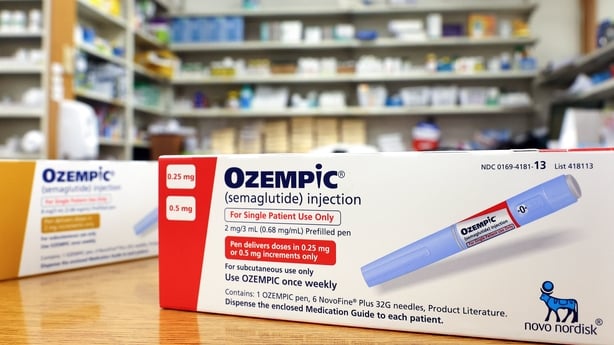Professor Donal O'Shea joined Brendan O'Connor on RTÉ Radio 1 to discuss Ozempic and the treatment of obesity. Listen back above.
The HSE Clinical Lead for weight loss spoke about new developments in hormone-based treatments, which have become available years earlier than he expected.
The top endocrinologist predicts that drugs like Ozempic will eventually be as common as tablets for lowering blood pressure or cholesterol. However, Professor O'Shea made a point of underlining the importance of diet and exercise when it comes to caring for our health.
Ozempic is a hormone-based treatment for diabetes that has been prescribed in Ireland for over 13 years. Recently, it’s been prescribed for the treatment of the disease of obesity, as it slows down the process of digestion and makes the person feel fuller for longer.
Ozempic contains semaglutide (a type of medication that mimics the GLP-1 hormone that is released in the gastrointestinal tract in response to eating). Dr O'Shea explains how it works:
"The companies have gradually turned a hormone that has a half-life of two minutes in your body into a treatment that will last a week in the form of injection."

Professor O’Shea first became aware of the research and testing of Ozempic when he was working in the UK, long before it was approved for use. He says Ozempic and Wegovy (this contains the same active ingedient as Ozempic, only stronger) represent a huge step forward in the treatment of obesity:
"It’s incredible progress. It’s the first, I’m gonna say safe, effective medical treatment we’ve had for obesity."
It should be noted here that there are a number of possible side effects that come from using Ozempic, with the most common being nausea, diarrhea, stomach pain, vomiting, and constipation. If you are considering using this drug, you should speak with your GP about whether it is right for you.
Now that a potential cure to obesity is in sight, O'Shea believes that public attitudes will change, in the same way as they did with epilepsy:
"What’s amazing about this point in the history of obesity, is that we have arrived at a point where there are treatments. The minute you can treat a disease, it truly underlines that it’s a disease. So, epilepsy was 'demons’ and 'possession’ until somebody said 'its brain activity and this treatment improves it and then people stopped seizing. And the exorcisms stopped."
Tonight on #rtept, the HSE's national clinical lead for obesity, Professor Donal O'Shea, discussed how he believes what others have termed a "wonder drug," Ozempic, should be used. pic.twitter.com/9V2fLsTwdX
— RTÉ Prime Time (@RTE_PrimeTime) June 1, 2023
Myths about weight loss are easily spread but difficult to quash, and O'Shea presented statistics about weight that may come as a surprise to many. He posits that once the weight has been gained, weight loss is incredible hard for most people:
"We now know how the body controls weight and it's 90% irreversible for 90% of people."
He claims that the ‘set point’ theory is real in that the body will always try to return to the highest weight it has achieved and stay there. The set point is very difficult to adjust without the help of medication or surgery, and Ozempic is one of the medications which can achieve it:
"What this medication does for people with obesity is it allows a re-set in their set point. Your body weight has a set point and your body always wants to get back to where it was - its peak weight."
The ability to hold on to weight is not a bad thing, Prof. O'Shea says. In fact, it has helped us evolve as a species and is as integral to our survival as breathing. He says that the tendency to obesity is largely genetic and once the weight is on, the body will fight to keep it.
According to him, these new hormone-based medications have the power to gently tweak that process into long-term weight loss, and that is what makes them so exciting for doctors and patients alike:
"I just never thought I would be sitting having this conversation. I didn’t think we’d get to this point during my career, so I am delighted and excited with where we are."
Ozempic is in short supply at the moment as it is in demand by people living with both diabetes and obesity. It’s currently not possible to prescribe Ozempic to every patient, he says, but even if you don’t have access to a weight loss drug, there is still a point to maintaining a healthy diet and exercise routine.

It may only shift the number on the scales by 5%, but doctors no longer take that number as the most important measure of health:
"We are less and less looking at weight as the metric, because, we know; what’s the point in looking at weight as the metric? Get fitter, eat healthier, be healthier."
Conditions like hypertension are now so easily managed with medication, compared to days gone by, and this is the direction we are going in now with the treatment of obesity, Dr O’Shea claims:
"We are looking at a 20-30 year timeline where obesity will become like blood pressure - it will be treatable. If you treat it and you treat it early, you will prevent the diabetes, you will prevent the heart disease, you will prevent the cancer. "
Listen back to Professor O’Shea’s interview with Brendan O’Connor above.

